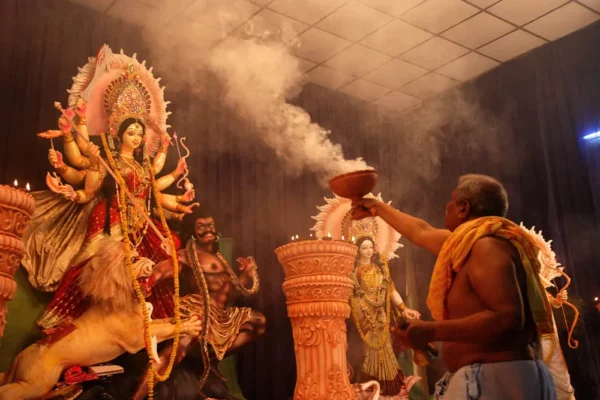People Opting for Eco-Friendly Ganpati Bappa Idols on Ganesh Chaturthi
One of India’s major festival is Ganesh Chaturthi, which is a Hindu festival celebrating the birth of elephant-headed Lord Ganesh. The ten-day festival is celebrated with great gaiety and fervor every year. People bring the idols of Ganesha to their homes, install and worship them. Then the idols are immersed into the natural water bodies on the tenth day.
The whole country rejoices with lord’s homecoming, local communities organize big functions and on the tenth day with great pomp and show the idols are carried out in public procession for the ‘Visarjan’ (immersion) into the nearby water bodies such as rivers or sea.
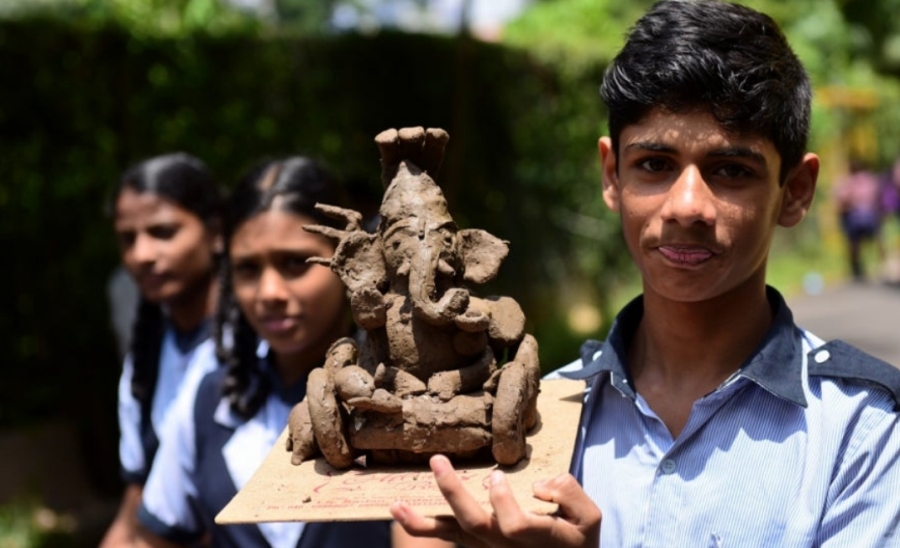
Eco-friendly Ganpati Bappa Idol on Ganesh Chaturthi / Photo: Ramoorthy P
The festival is a representative of the cultural and religious heritage of the country. But the massive celebration leaves so much of waste behind, especially the immersed effigies of Ganpati in the water. The festival is majorly celebrated throughout the southern part of India and Mumbai alone immerses 150,000 statues of lord every year. Therefore, it goes without saying that the upcoming Ganeshotsav is a big challenge for Swachh Bharat Abhiyan.
Under these circumstances, when water resources are fast depleting and are being constantly polluted through one way or the other, it is absolutely necessary that people opt for eco-friendly celebrations of such a grand festival.
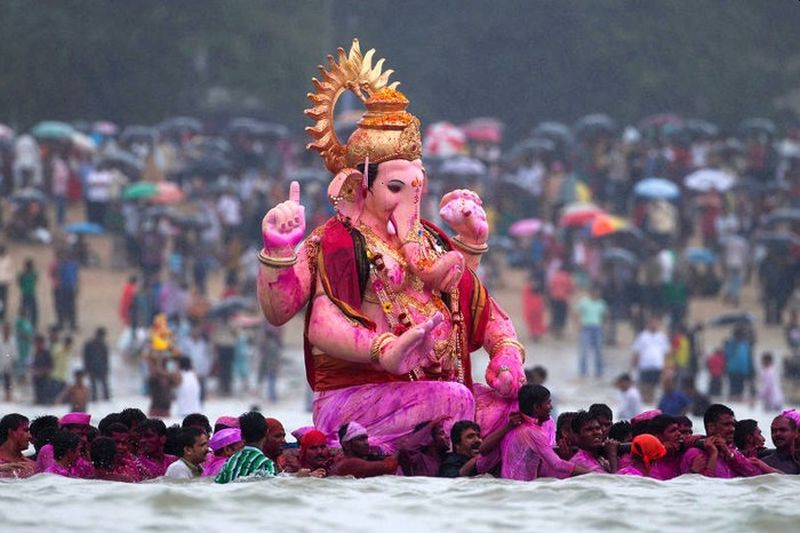
Ganpati Visarjan / Image: Dainik Bhaskar
National Green Tribunal banned the use of idols made of plaster of Paris in 2015 and gave instructions to remove accessories and other non-degradable items off of them before the immersion. Since the past few years, many environmentalists and NGOs are working toward green celebrations of Ganeshotsav.
The sculpturists are using eco-friendly materials in making of effigies of Lord Ganesh – clay, lentils, bamboo, waste paper and water-soluble colors are few of them among the long list. The communities have built artificial tanks and ponds to immerse the idols to prevent natural water bodies from pollution.
For the grand ten-day celebration of the birth of the deity, huge pandals are installed every year. This year, alone in Mumbai 2000 pandals will be installed for Ganesh Chaturthi, which is going to commence from September 2 onwards.
People are adopting healthy and green-ways to celebrate the festivity. A couple of years ago, Go-Go Organization and Uttishtha Bharat made idols out of cow dung. eCoexist foundation creates these eco-friendly Ganesh idols out of the soil which is a good initiative.
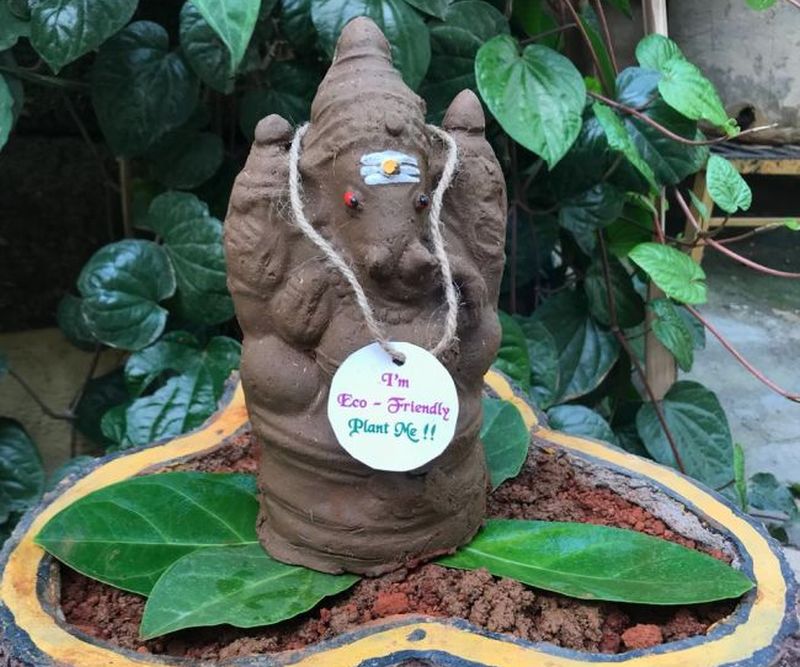
Plantable Ganesha / Image: SwachhIndia.NDTV
Tejukaya Ganesh Utsav Mandal, Mumbai, has installed a 22 ft. The mesmerizing Ganesh idol that is made of mud and paper urges the devotees to use eco-friendly materials in celebrating Ganesh Utsav this year.
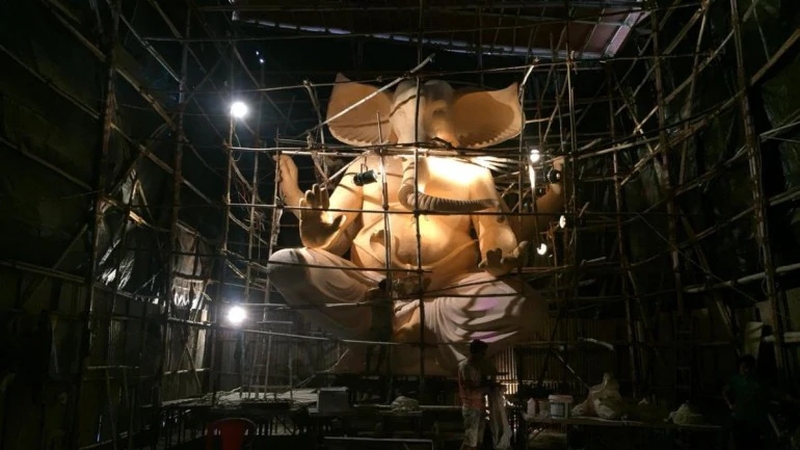
Ganesh Idol made from paper and mud / Image: India Today
Some artists in Dhoolpet, Hyderabad have created Ganpati effigies out of paper cups which is quite easy to emulate. The idols made from paper cups look attractive and also easy on the environment when eventually they are put in the water for visarjan.
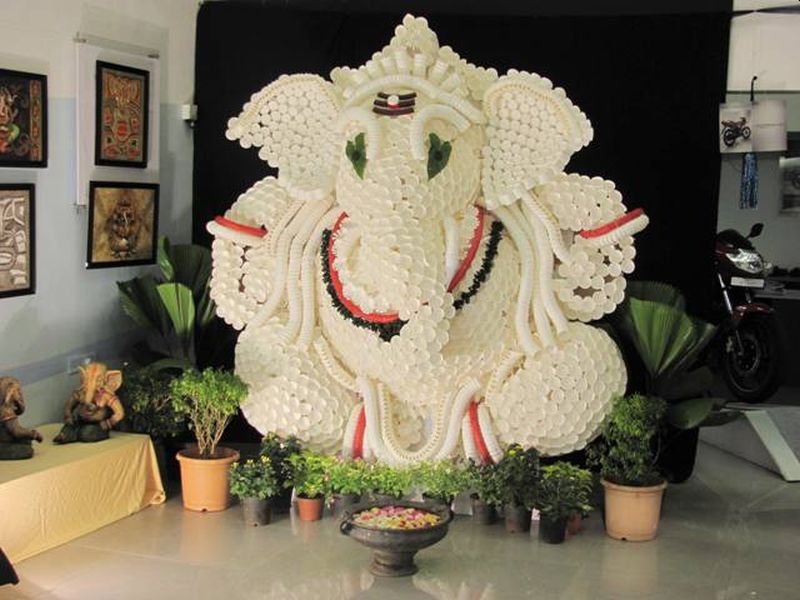
Paper cup Ganesha / Image: Mangalore Today
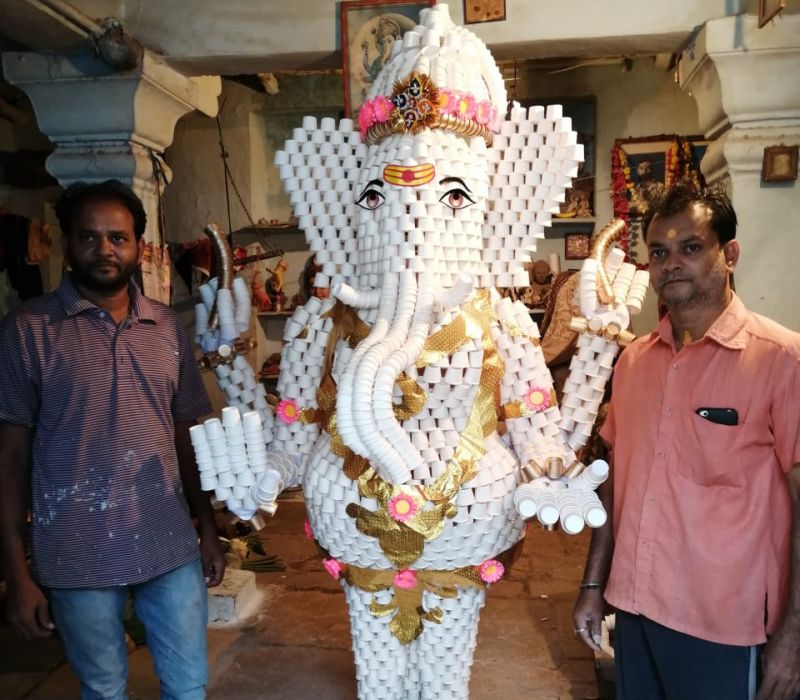
Artists in Hyderabad with their paper cup Ganpati / Image: Siasat
Many schools in the country have organized idol-making workshops during the month of august for upcoming Ganeshotsav. 2,138 people participated in the idol-making event in Bengaluru on August 25.
Apparently, the event created a Guinness Book world record for the highest number of people gathered for sculpting with model clay.
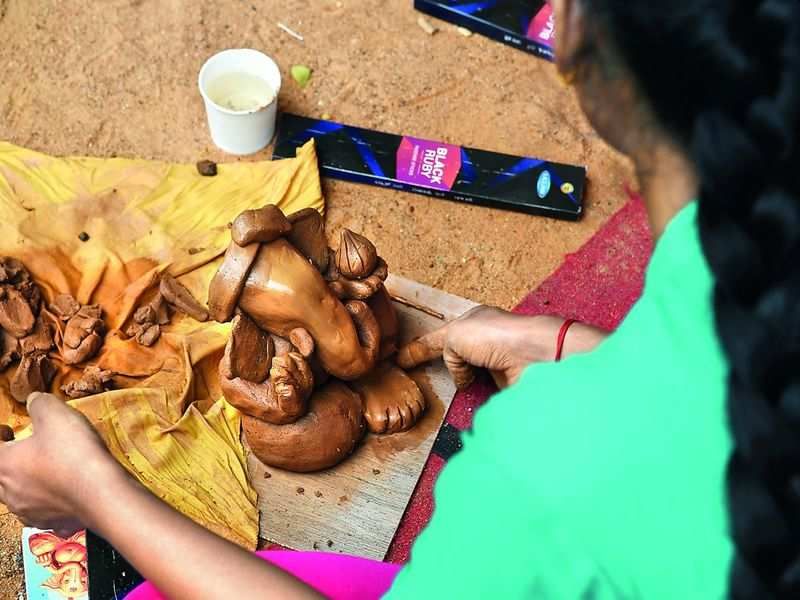
Bengaluru’s eco-friendly idol-making event with 2,138 people / Image: Times of India
26-year-old social entrepreneur, Binish Desai, from Gujrat created an eco-friendly Ganesh statue using the jewelry waste. The idols he has been manufacturing are not ideal for traditional visarjan but are durable and can be used year after year.
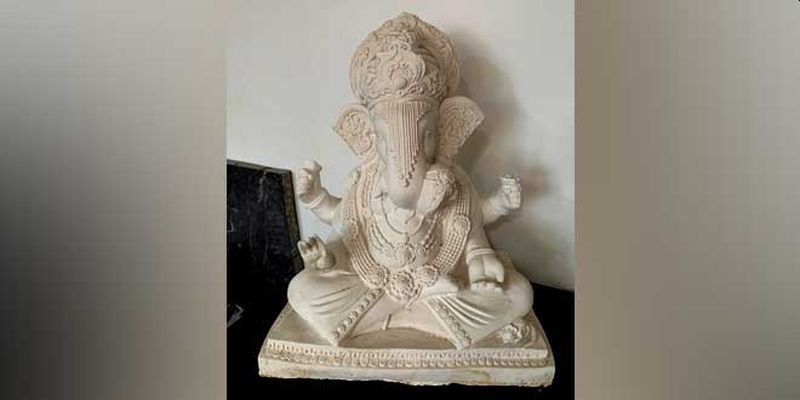
Ganesh idol made of jewelry waste / Image: SwachhIndia.NDTV
With the rage for eco-friendly idols, people are also making plantable soil statues – putting seeds inside them so they can be planted after the festival.
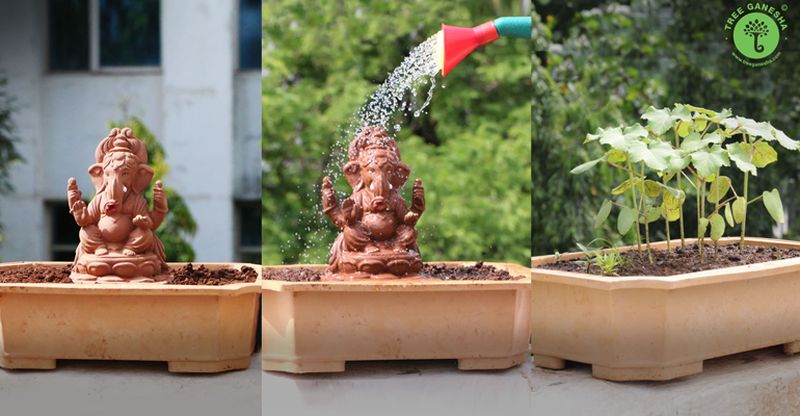
Plantable Ganesha / Image: Life beyond Numbers
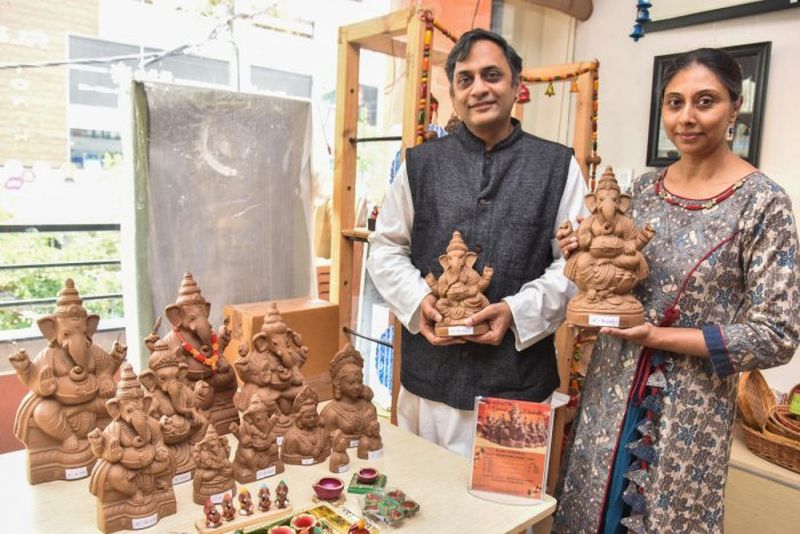
People buying eco-friendly Ganpati idol with basil seeds / Image: Deccan Herald
Many celebrities are also contributing their creative side in eco-friendly celebrations of Ganesh Chaturthi. Actor Riteish Deshmukh has been making clay idols for his home every year.
I made the Ganesha idol at home out of Mud-clay. I want to be responsible towards my environment,hope we can leave a better-cleaner planet for our children. They learn from what they see. wishing you all happiness & prosperity #HappyGaneshChaturthi #ecofriendly #GanpatiBappaMorya pic.twitter.com/qhWBsXdvw1
— Riteish Deshmukh (@Riteishd) September 2, 2019
Celebrating #GaneshChaturthi in America, Made an idol, I humbly dedicate it to our Farmers. #ECO #Planter #Visarjan #SonOfAFarmer #Bappa pic.twitter.com/OnuU1S0D6a
— Riteish Deshmukh (@Riteishd) August 27, 2017
Likewise, Actress Amrita Rao has collaborated with Beach Warriors to launch eco Bappa Morya campaign.
Bollywood actor Arjun Rampal shared a video on Instagram where devotees have created a Ganpati idol using fresh oranges in Holland.
View this post on Instagram
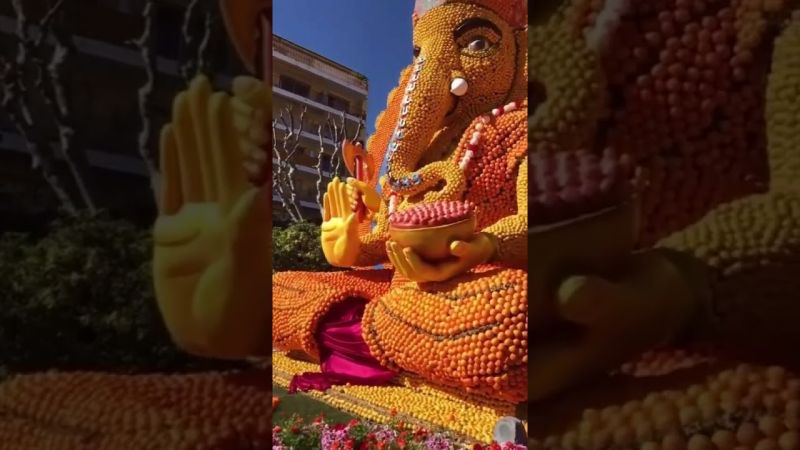
Ganpati idol made of oranges by devotees in Holland / Image: YouTube
People have also been crafting idols of Bappa out of fruits and vegetables which can be later distributed among the devotees at the end of the festival. In 2017, members of Nataraj Club from Odisha built an idol of the lord from raw bananas.
The idea was that bananas would eventually ripe in the course of ten days and would be distributed among the poor.
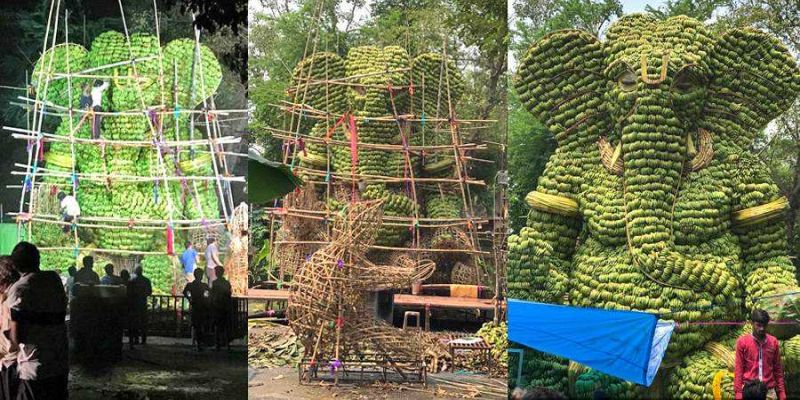
Ganpati idol made of bananas and bamboo / Image: New India Express
Similarly, this year an idol made of coconuts has been installed near Puttengally Ganesh Temple in Bengaluru. The devotees worked for 20 days to create this 30 feet high eco-friendly effigy. The 9000 coconuts used in the making of the idol would be shared among people after it is dismantled.
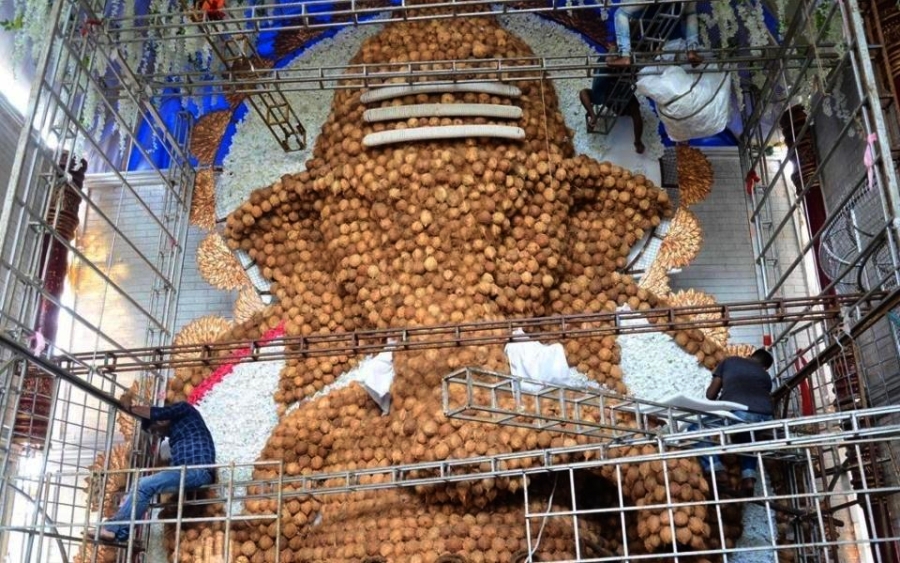
Devotees during the making of Ganesha idol / Image: Social News
People have been experimenting with Ganesh idol making materials for a while now. Ludhiana based chocolatier Harjinder Singh Kukreja has been making idols of chocolate for past four years. This year too, he has created a beautiful idol of Lord Ganesha with more than 100kg of Belgian chocolate.
Since it is made of chocolate, it won’t be immersed in the water but in milk. This chocolate milk would feed the underprivileged children in the city.
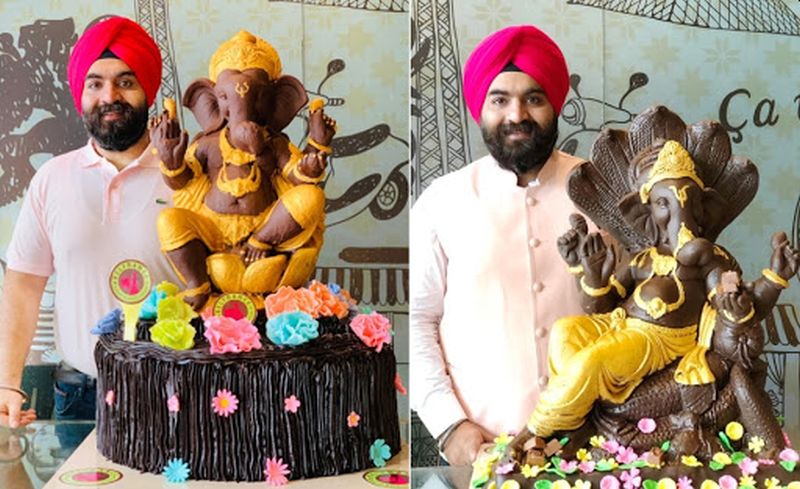
Harjinder Singh with his chocolate Ganpati / Image: Harjinder Singh Kukreja
Bangle Ganesha is yet another attraction of Ganeshotsav this year. The people in Chittoor, Andhra Pradesh, amazed everyone when they installed 30 feet tall idol of Ganpati which is made of 2 lakh bangles.
Unlike other idols having the traditional ritual of immersion, this idol won’t be immersed in the water. Instead, it would be dismantled and the bangles would be distributed to the women in the neighborhood.
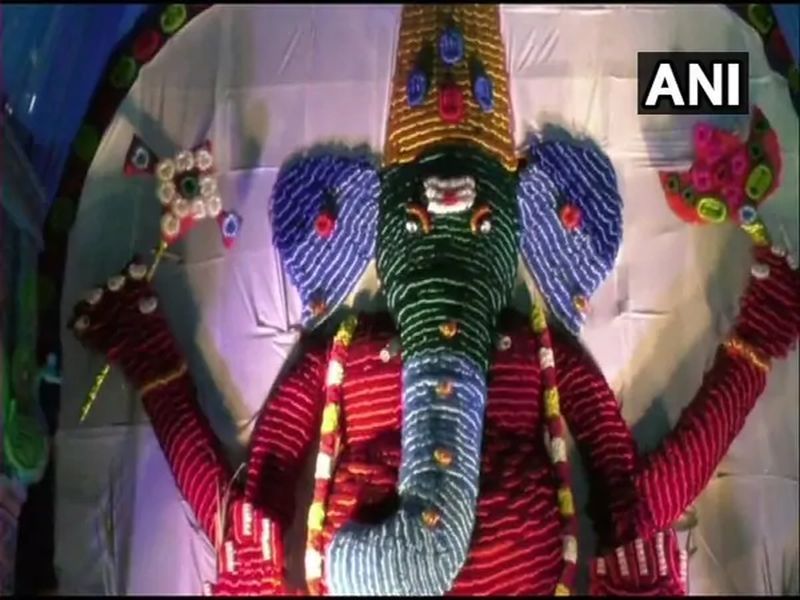
Idol of Ganesha made of 2 lakh bangles / Image: ANI
The idol makers are surprised at the massive demands for environmentally-friendly effigies this year. Though the process is lengthy and needs a lot of time in the making process, sculptors are happy that their work can help safeguard nature.
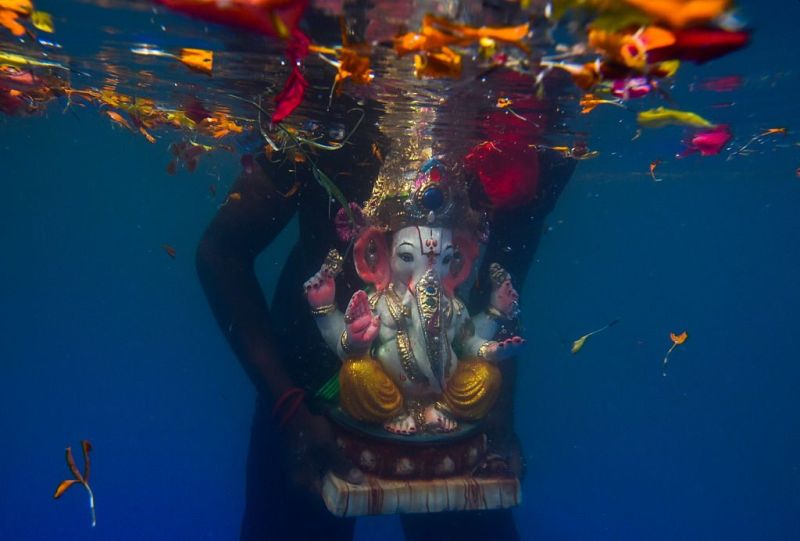
Ganpati Visarjan ( immersion) / Image: Hindustan Times
The environmentalists are educating people of the side-effects of immersing effigies in water bodies. The water resources get polluted and aquatic lives face life threats. Every year, after the emotional visarjan of their beloved Ganpati Bappa, people go home without paying any attention to what their actions would result into.
The harmful chemicals and non-degradable materials used in the making of the idols adversely affect the aquatic organisms and many dead fishes, turtles and sea snakes wash up to the shores every year post-immersion of Ganesh idols.
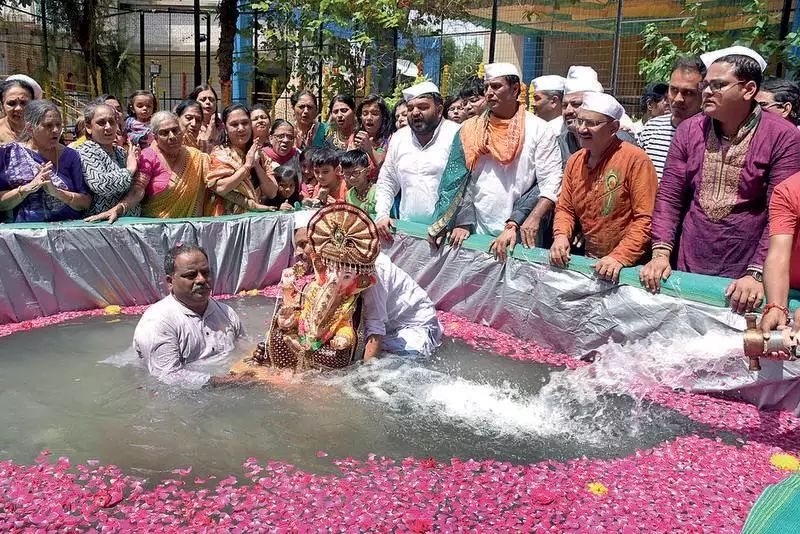
Ganpati visarjan in artificial tanks / Image: Times of India
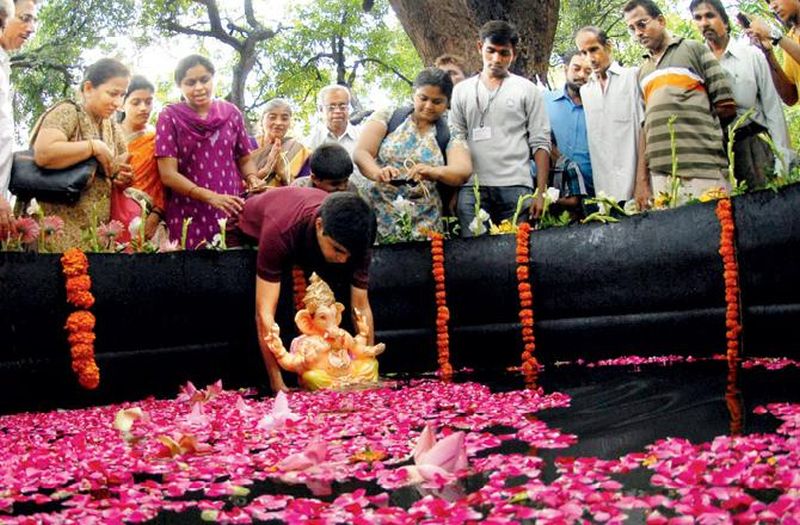
Ganpati visarjan in artificial tanks / Image: Mid Day
It is not just the idols that contribute to the pollution, but the loud celebrations using microphones and music systems also affect nature adversely. The traditional chanting of prayers and songs by people along with the drums has been lost for the most part of the celebration. Instead of polluting the environment, people should celebrate this holy festival in an old school manner with traditional drums and chants.
The healthy way to call up Ganpati Bappa next year is to embrace the green celebrations and eco-friendly effigies.
It’s not too late, celebrate this year’s Ganesh Chaturthi in a healthy and green manner, and Bappa will definitely return next year to shower his devotees with love.
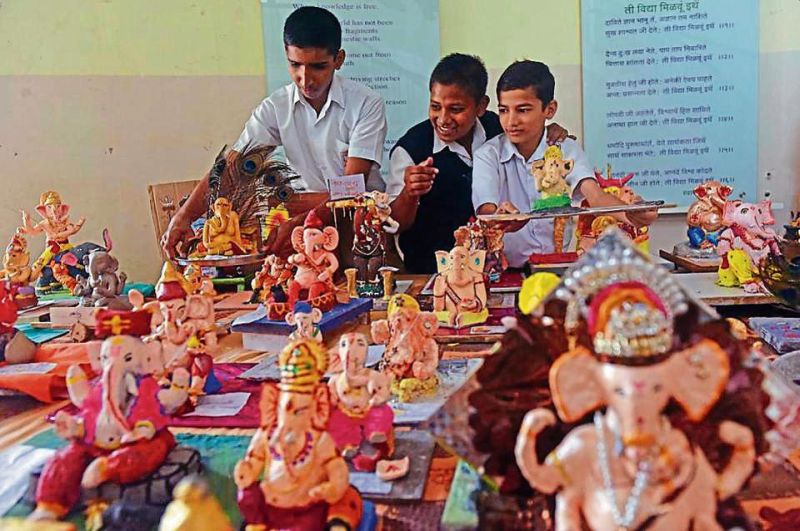
Students displaying their eco-friendly Ganesh idols / Image: Hindustan Times


